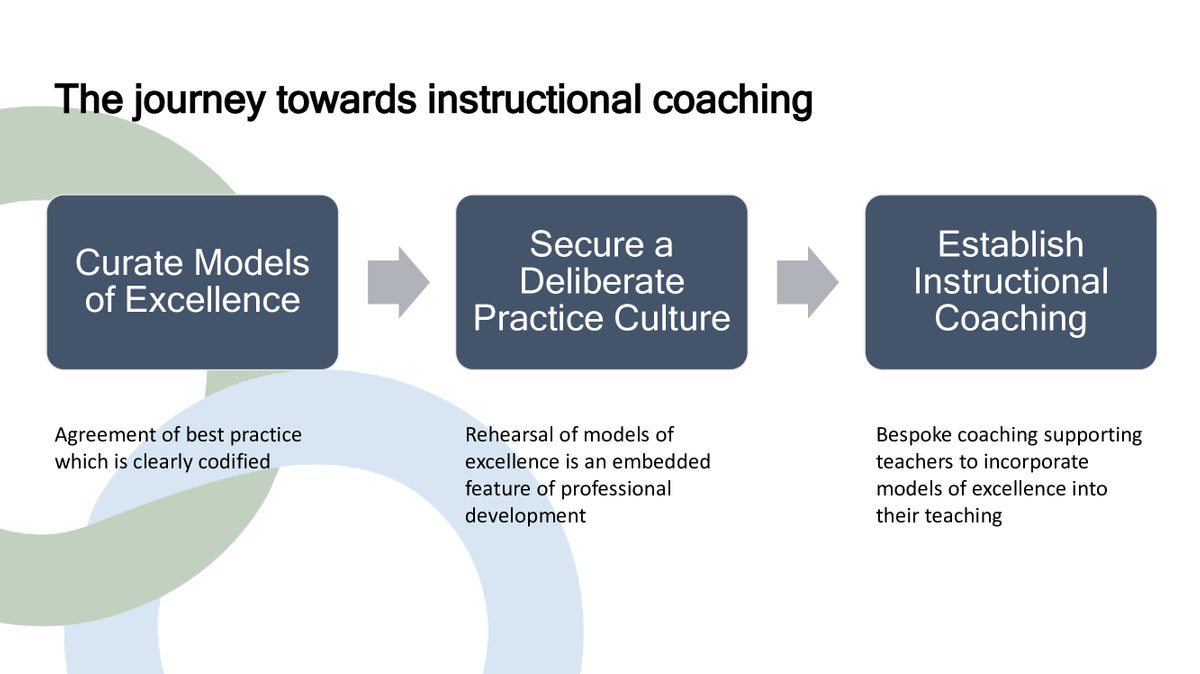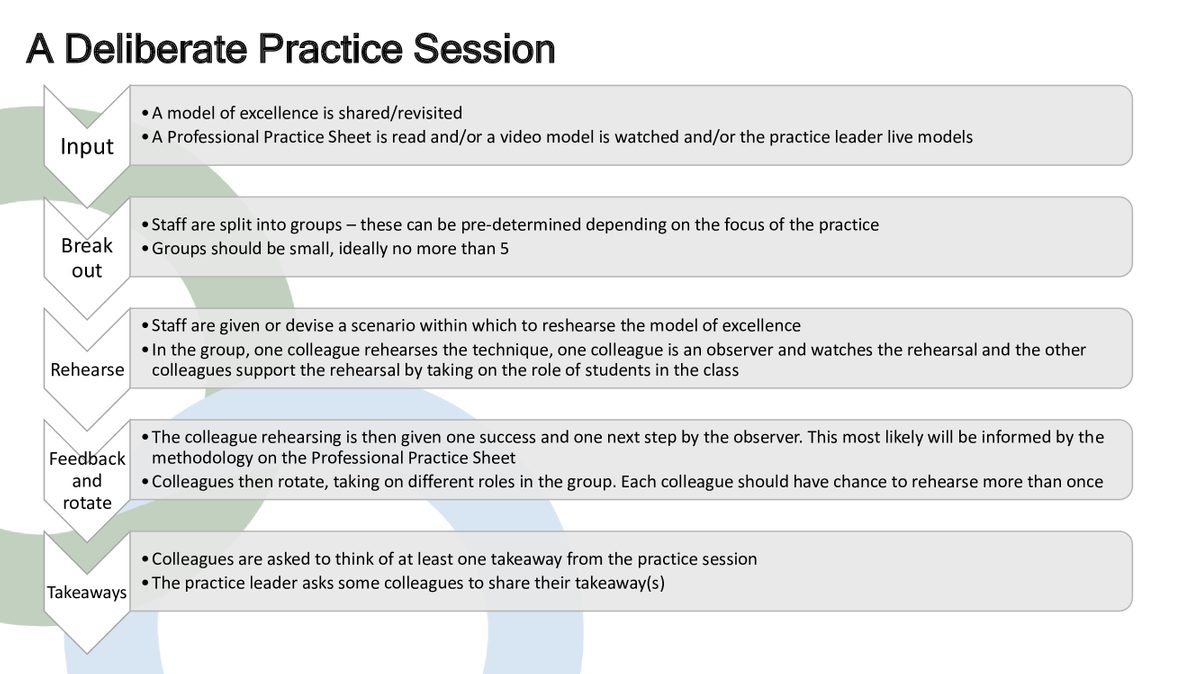
Blog -
Share on:

by Research Schools Network
on the
Jon Gilbert (Professional Development Director at The Two Counties Trust), Sue Gascoigne (Assistant Headteacher at Frederick Gent School) and Karen Whitehead (Assistant Headteacher at Swanwick Hall School) explore deliberate practice as part of their effective professional development.
At The Two Counties Trust (TTCT), our mission is to provide students with opportunities and experiences to enhance their life choices, making a positive contribution to the world we share. Research suggests, to achieve this, staff must have access to effective professional development (PD). That’s why our schools are committed to establishing high-quality instructional coaching (IC) as an entitlement for all.
However, introducing school-wide IC is not simple. It must be done carefully, ensuring the requisite knowledge, culture and systems are in place. At TTCT, our journey towards the entitlement of IC is following a process, outlined here:

Our first step was to define our destination. We decided that if we wanted to coach staff, it would be important to have a clear idea what we are coaching towards.
We dedicate time and effort to research best practice and curate ‘models of excellence’ which codify what that excellence looks like. This codification is communicated using ‘Professional Practice Sheets’ and accompanying video models. The Professional Practice Sheets outline the rationale for a particular model of excellence and its methodology. Here is an example:

The second step in the process was to secure a culture of rehearsal through deliberate practice. Rehearsal is a key component of IC. However, for many staff, rehearsing in front of colleagues and receiving feedback on their performance feels unfamiliar. We knew that if we wanted staff to engage in IC, there needed to be a cultural shift towards rehearsal being the norm. TTCT schools are setting aside time for whole-staff deliberate practice sessions.
Deliberate practice can and should be a standalone feature of PD in a school, whether accompanied by bespoke IC or not. Colleagues rehearsing models of excellence together and receiving feedback helps to secure consistency.
Of course, there are a number of factors which contribute to effective teacher development, and practice in isolation can only go so far. However, as Sue Gascoigne, Assistant Headteacher at Frederick Gent School (1 of 9 TTCT schools) puts it ‘In so many ways, deliberate practice is a “no-brainer”. Other professions practise for hours before they are let loose on a plane full of passengers or on a body in the operating theatre… so why not teachers?’
The diagram below shows how a typical practice session may be structured:

Our practice sessions take place regularly and may be relatively short (for example, one 25-minute practice session each week). We’ve found it to be important that practice takes place in a low-stakes environment in which staff are open to feedback. The focus of practice sessions is needs-based, informed by ‘learning walks’ or other live data, or pre-determined based on school priorities.
Here are two case studies from schools within the Trust which illustrate how they have introduced deliberate practice sessions:
Sue Gascoigne, Assistant Headteacher at Frederick Gent School:
We have invested heavily in providing the time for deliberate practice with the teaching staff. All staff who run lessons or sessions for students have an hour a fortnight of timetabled time in a deliberate practice session led by the senior leadership team. The sessions are based on codified models of good practice, are carefully scripted using the “name it, see it, do it” approach and have “real life” scenarios to work with.
Running alongside the deliberate practice sessions are our daily culture checks. These give us live feedback about the impact the practice sessions are having, tell us what is working and what needs more practice – feeding forwards into our next timetabled cycle. The response from staff has been positive.
The early signs are that they enjoy the practice sessions and value the PD and… even better…we can see the techniques practised transferring into the classroom!
Karen Whitehead, Assistant Headteacher at Swanwick Hall School:
Practising with peers allows colleagues to receive feedback to further refine their practice and the conscious focus on rehearsing significantly increases the chance of automaticity.
Practice sessions take place weekly for 15 minutes and take place before each calendared meeting. Teaching staff work in groups of three, sometimes with members of their own faculty and sometimes with groups mixed by specialism and levels of experience.
Some examples of models of excellence that we have rehearsed include habits of attention, no opt out, radar and hinge questions.
Staff have responded very positively to the deliberate practice sessions and engage very well each week. Overall, deliberate practice and the weekly PD it offers has been a very positive change to our practice and we have noticed much greater levels of consistency.
References
Deans for Impact, 2016. Practice with Purpose: The Emerging Science of Teacher Expertise., Austin, TX: Deans for Impact.
Education Endowment Foundation, 2021. Effective Professional Development Guidance Report, s.l.: EEF.
Ericsson, A. & Pool, R., 2016. Peak: Secrets from the new science of expertise. London: Bodley Head.
For one discussion of some of the limitations of deliberate practice, see Fletcher-Wood, H., 2018. Problems with deliberate practice: can we use it in teacher education?. [Online] Available at: https://improvingteaching.co.u… [Accessed February 2023].
The Two Counties Trust, n.d. The Two Counties Trust Strategic Plan. [Online] Available at: https://www.ttct.co.uk/our-tru…;

Blog -

Blog -

Blog -
This website collects a number of cookies from its users for improving your overall experience of the site.Read more